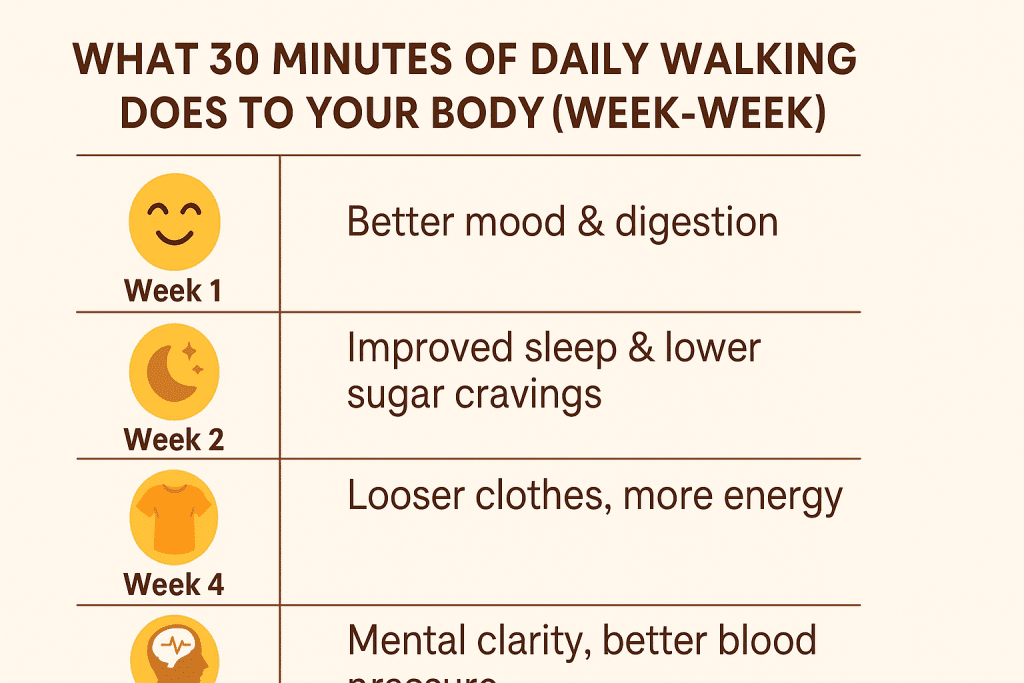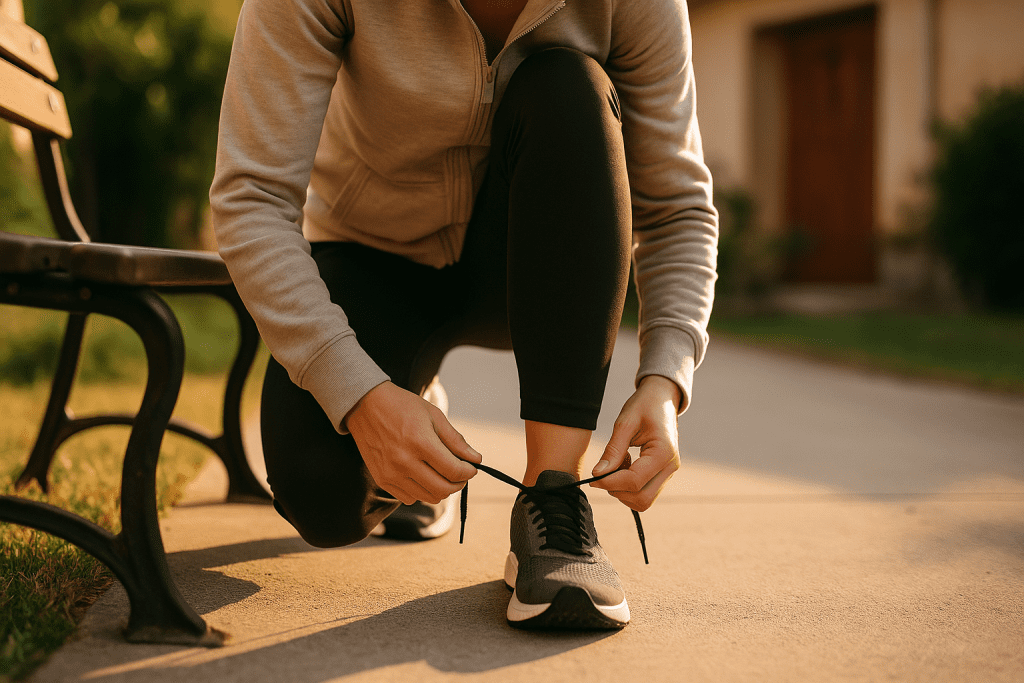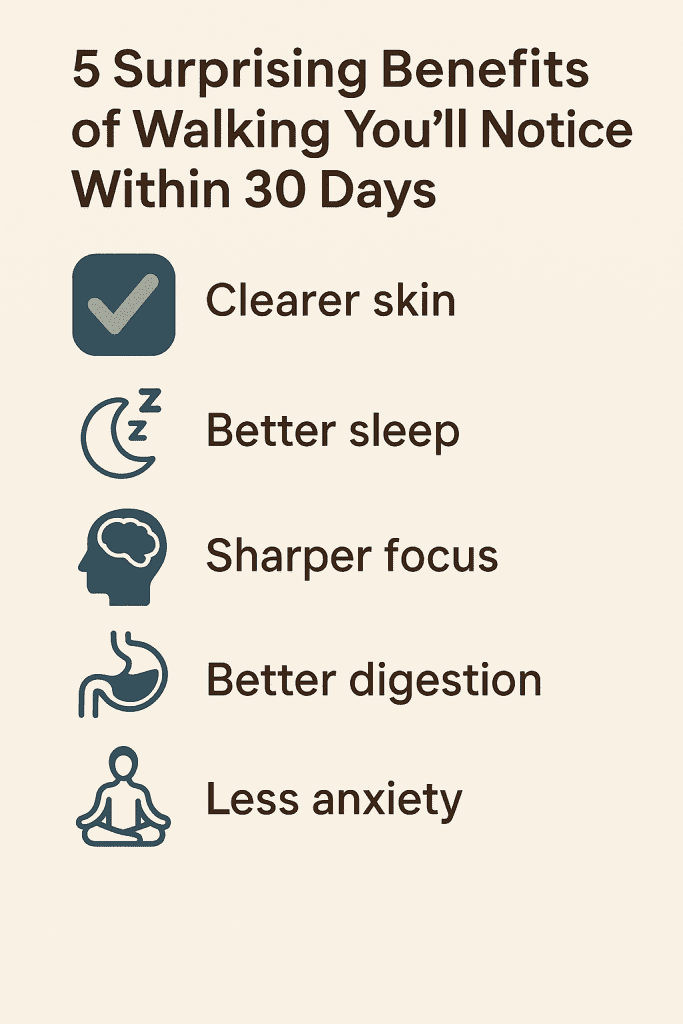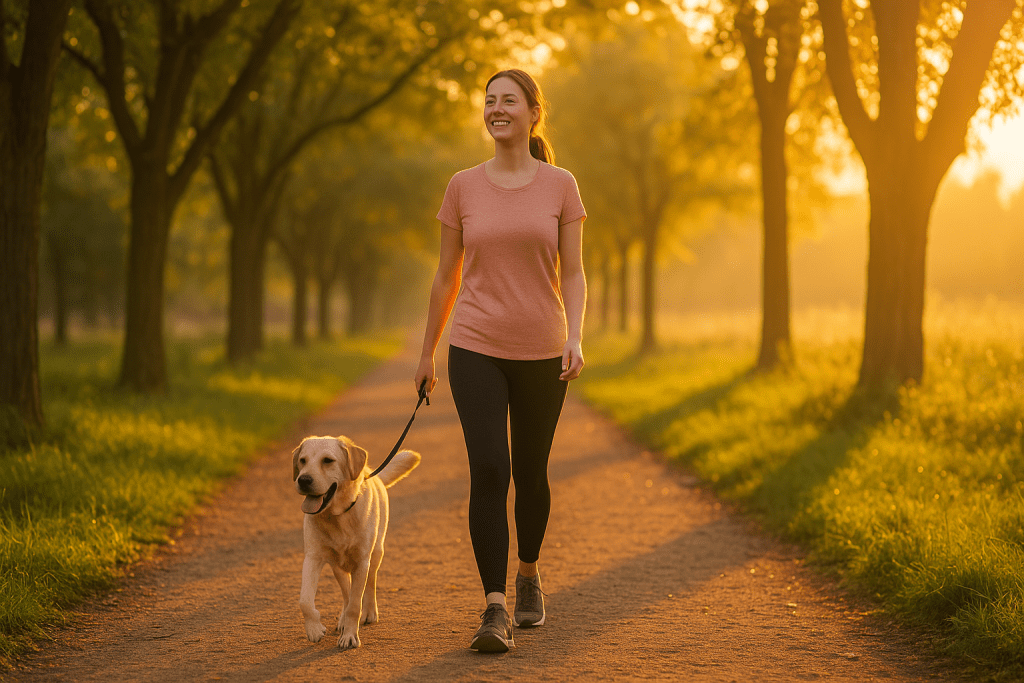This Is What Happens to Your Body When You Walk Just 30 Minutes Every Day — And Why You’ll Regret Not Starting Sooner
It started with a promise I made to myself on a regular Tuesday: “I’ll just walk for 30 minutes today.” No pressure, no steps goal, no fancy shoes. Just me, some fresh air, and a little movement. What I didn’t expect was how deeply those 30-minute walks would change not just my body — but also my mind, my mood, and even my sleep.
I used to think exercise had to be complicated. Gym memberships, protein shakes, and that guilty feeling when you skip a day. But walking? It felt too easy. Turns out, that’s the magic of it.
The Science-Backed Changes That Sneak Up On You

Let’s start with the obvious one — your physical health. We know that walking helps burn calories, right? But here’s something interesting: you don’t need to power-walk or go uphill for hours. Just 30 minutes a day, at a moderate pace, can help you burn around 150–200 calories depending on your weight and speed. Over time, this adds up. I personally didn’t lose weight immediately, but after a couple of weeks, my jeans started feeling a little looser around the waist.
But here’s the part people don’t talk about enough — how you feel after the walk.
I remember one night after dinner, I was feeling heavy and kind of sluggish. I almost skipped the walk. But I pushed myself to go anyway. I walked slowly at first. After 10 minutes, my legs warmed up. I started breathing deeper. By the time I hit 25 minutes, I felt lighter — not just in my body, but in my mood. That low-level anxiety I was carrying all day just… faded.
This isn’t just in my head. According to studies from Harvard and Mayo Clinic, walking regularly helps reduce cortisol, the stress hormone. It also triggers the release of endorphins, which are those feel-good chemicals your brain loves. You don’t need a therapist or medication to get a small daily dose of mental calm — sometimes, it’s just a walk away.
More Than Physical: The “Invisible” Benefits You Start to Notice

After the first few days of daily walking, I noticed something strange: I was sleeping better. I wasn’t scrolling till 2 a.m. anymore, and my brain wasn’t racing like usual. I felt naturally sleepy by 11 p.m., and when I woke up, I actually felt rested. That wasn’t happening before.
There’s a reason for this. Walking during the day helps regulate your circadian rhythm, especially if you walk in the sunlight. It signals your body when it’s time to be alert and when it’s time to wind down. Think of it like setting your body’s internal clock back to its factory settings.
And let’s talk about digestion. Have you ever gone for a walk after a meal and noticed you didn’t feel as bloated? That’s real. Gentle movement after eating helps food move through your system more easily. I started walking 15–20 minutes after dinner, and my bloating, gas, and post-meal fatigue dropped significantly.
People often ask me: “But is walking enough? Shouldn’t I be lifting weights or doing cardio?” Sure, if you can and want to, go for it. But if you’re starting from a place of no movement — maybe you work long hours at a desk or you’re recovering from burnout — walking is not just enough. It’s perfect. It’s accessible, gentle, and consistent. That’s a powerful trio.
What Walking Does to Your Heart, Brain, and Body (Even If You Don’t Feel It)
Let’s zoom in a little. Walking doesn’t just make you “feel good” — it actually improves your body on the inside, even if you don’t see it happening.
Heart health:
Just 30 minutes of brisk walking five days a week can reduce your risk of heart disease by up to 19%, according to the American Heart Association. That’s almost as effective as running, minus the strain on your knees. Walking strengthens the heart, improves blood circulation, and helps regulate blood pressure.
Blood sugar control:
For people with insulin resistance or type 2 diabetes, post-meal walking can lower blood sugar spikes. It gives your muscles a gentle nudge to use up glucose, reducing the load on your pancreas. This is something even doctors recommend now — and it’s way easier than popping pills or worrying about every carb.
Brain health:
This one’s my favorite: walking regularly can increase the size of your hippocampus, the part of the brain that helps with memory and learning. That’s wild. It’s like feeding your brain without doing any mental work. Plus, it’s been linked to a lower risk of depression, anxiety, and even Alzheimer’s in older adults.
And let’s not forget joints and bones. People think walking isn’t intense enough to help joints — but that’s not true. Movement keeps the joints lubricated and builds up the muscles that support them. As someone with occasional knee pain, I noticed less stiffness the more I walked.
Real People, Real Changes
On TikTok, a woman named Sarah shared her 30-day walking challenge journey. No intense workouts, just a daily walk in the evening. By day 20, she said she wasn’t craving sugar the same way. “I used to end every day with chocolate or ice cream,” she said. “Now I’m full and calm after dinner — it’s crazy.”
Reddit’s r/loseit community is full of walking success stories. One user wrote, “I was 280 pounds when I started walking around the block every day. Now I’m down to 210, and all I did was walk 30 minutes religiously, rain or shine.”
You don’t need to climb a mountain. You don’t need an Apple Watch or fancy sneakers. You just need to start.
Walking 30 Minutes a Day Might Be the Easiest Healthy Habit You’ll Ever Build

We all want big results — weight loss, better energy, glowing skin, calm sleep. But most of us struggle to stick with complicated routines. The beauty of walking is that it doesn’t ask for much. No gym. No schedule. Just time, commitment, and a decent pair of shoes.
At first, it might feel boring. You’ll be tempted to skip. But somewhere between day 7 and day 10, it clicks. You start craving that time with yourself. You begin looking forward to the mental reset, the slow scenery, the little conversations you have in your head. Your body starts rewarding you with better digestion, better sleep, and more stable energy.
It’s free. It’s easy. And honestly, it might just be one of the most powerful things you can do for your health — no matter your age, size, or background.
So if you’re still wondering if it’s worth it, here’s your sign: just start walking today. 30 minutes. That’s it. You won’t regret it.



